Ethical and Legal Decision-Making in Person-Centred Care: A Case Study
VerifiedAdded on 2023/04/10
|10
|2647
|289
Essay
AI Summary
This essay examines the ethical and legal considerations involved in a nursing scenario concerning a 14-year-old patient, Taylah, who seeks contraceptives. The essay delves into the legal aspects, including consent and privacy, particularly in the context of the patient's age and the jurisdiction's laws. It emphasizes the importance of respecting patient autonomy and confidentiality. The essay then explores ethical principles, such as beneficence, non-maleficence, and respect for autonomy, within the framework of the case study. The author analyzes how these principles guide the nurse's actions and decision-making in providing care to Taylah, including addressing her risky behaviors and ensuring her well-being. The essay highlights the need for nurses to balance legal obligations with ethical responsibilities, ensuring high-quality, patient-centered care.
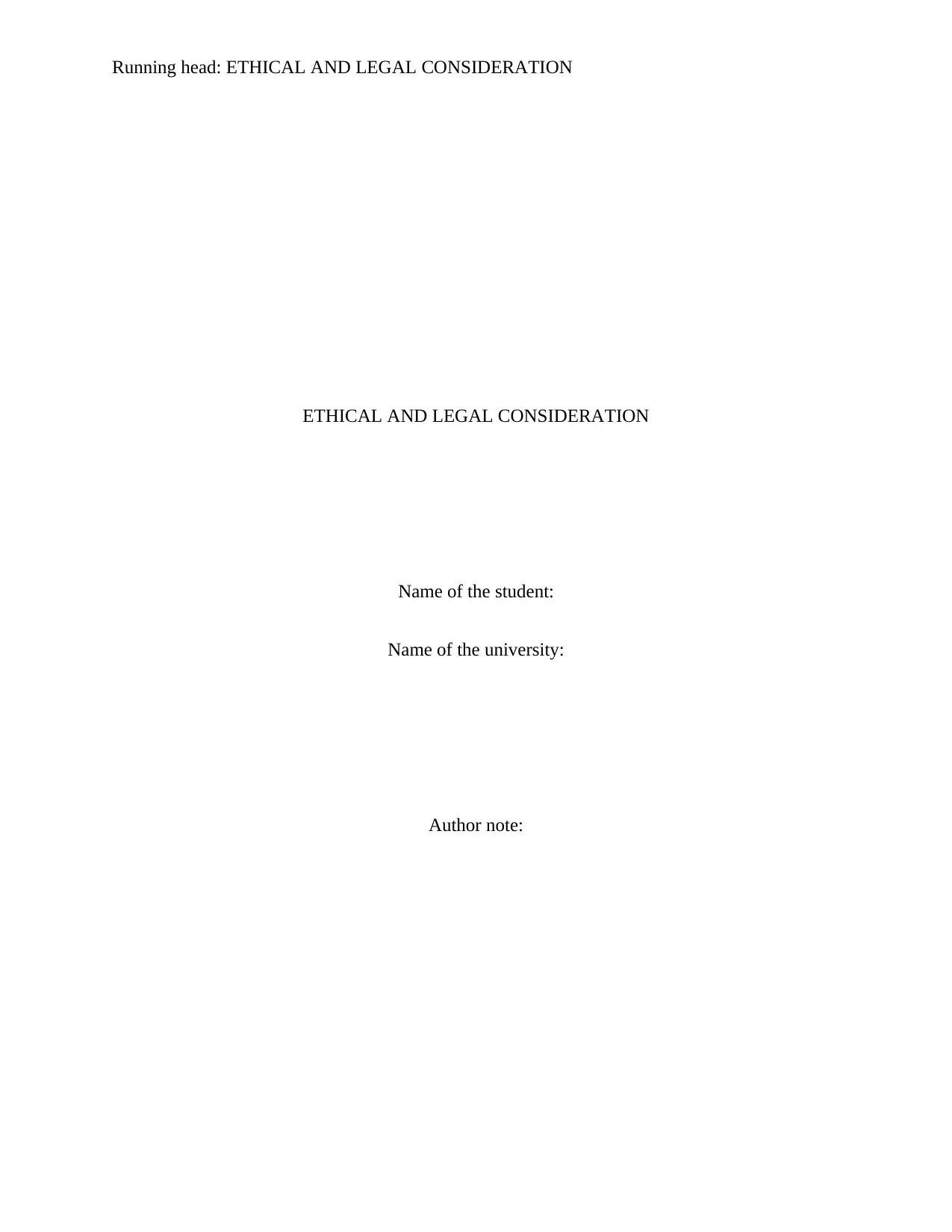
Running head: ETHICAL AND LEGAL CONSIDERATION
ETHICAL AND LEGAL CONSIDERATION
Name of the student:
Name of the university:
Author note:
ETHICAL AND LEGAL CONSIDERATION
Name of the student:
Name of the university:
Author note:
Paraphrase This Document
Need a fresh take? Get an instant paraphrase of this document with our AI Paraphraser
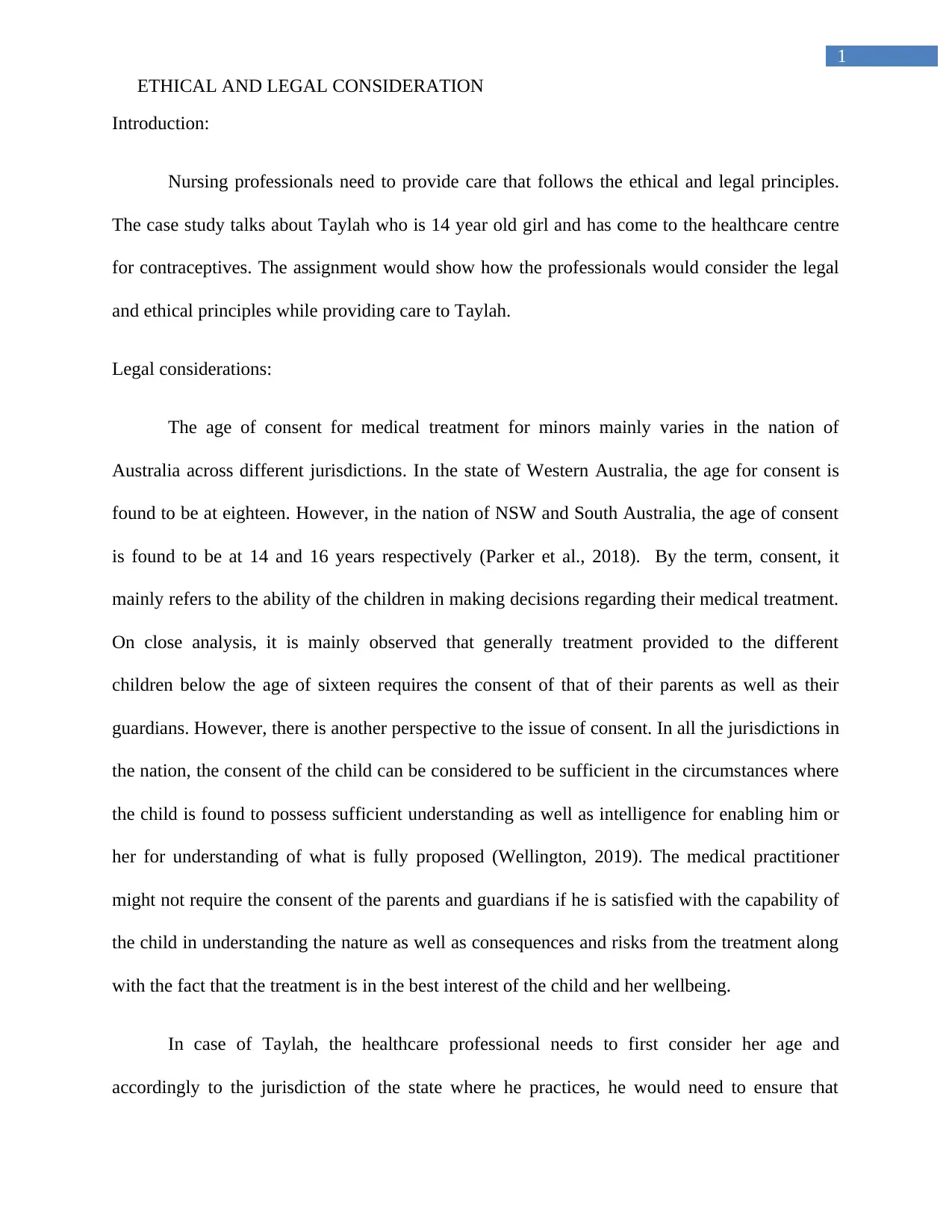
1
ETHICAL AND LEGAL CONSIDERATION
Introduction:
Nursing professionals need to provide care that follows the ethical and legal principles.
The case study talks about Taylah who is 14 year old girl and has come to the healthcare centre
for contraceptives. The assignment would show how the professionals would consider the legal
and ethical principles while providing care to Taylah.
Legal considerations:
The age of consent for medical treatment for minors mainly varies in the nation of
Australia across different jurisdictions. In the state of Western Australia, the age for consent is
found to be at eighteen. However, in the nation of NSW and South Australia, the age of consent
is found to be at 14 and 16 years respectively (Parker et al., 2018). By the term, consent, it
mainly refers to the ability of the children in making decisions regarding their medical treatment.
On close analysis, it is mainly observed that generally treatment provided to the different
children below the age of sixteen requires the consent of that of their parents as well as their
guardians. However, there is another perspective to the issue of consent. In all the jurisdictions in
the nation, the consent of the child can be considered to be sufficient in the circumstances where
the child is found to possess sufficient understanding as well as intelligence for enabling him or
her for understanding of what is fully proposed (Wellington, 2019). The medical practitioner
might not require the consent of the parents and guardians if he is satisfied with the capability of
the child in understanding the nature as well as consequences and risks from the treatment along
with the fact that the treatment is in the best interest of the child and her wellbeing.
In case of Taylah, the healthcare professional needs to first consider her age and
accordingly to the jurisdiction of the state where he practices, he would need to ensure that
ETHICAL AND LEGAL CONSIDERATION
Introduction:
Nursing professionals need to provide care that follows the ethical and legal principles.
The case study talks about Taylah who is 14 year old girl and has come to the healthcare centre
for contraceptives. The assignment would show how the professionals would consider the legal
and ethical principles while providing care to Taylah.
Legal considerations:
The age of consent for medical treatment for minors mainly varies in the nation of
Australia across different jurisdictions. In the state of Western Australia, the age for consent is
found to be at eighteen. However, in the nation of NSW and South Australia, the age of consent
is found to be at 14 and 16 years respectively (Parker et al., 2018). By the term, consent, it
mainly refers to the ability of the children in making decisions regarding their medical treatment.
On close analysis, it is mainly observed that generally treatment provided to the different
children below the age of sixteen requires the consent of that of their parents as well as their
guardians. However, there is another perspective to the issue of consent. In all the jurisdictions in
the nation, the consent of the child can be considered to be sufficient in the circumstances where
the child is found to possess sufficient understanding as well as intelligence for enabling him or
her for understanding of what is fully proposed (Wellington, 2019). The medical practitioner
might not require the consent of the parents and guardians if he is satisfied with the capability of
the child in understanding the nature as well as consequences and risks from the treatment along
with the fact that the treatment is in the best interest of the child and her wellbeing.
In case of Taylah, the healthcare professional needs to first consider her age and
accordingly to the jurisdiction of the state where he practices, he would need to ensure that
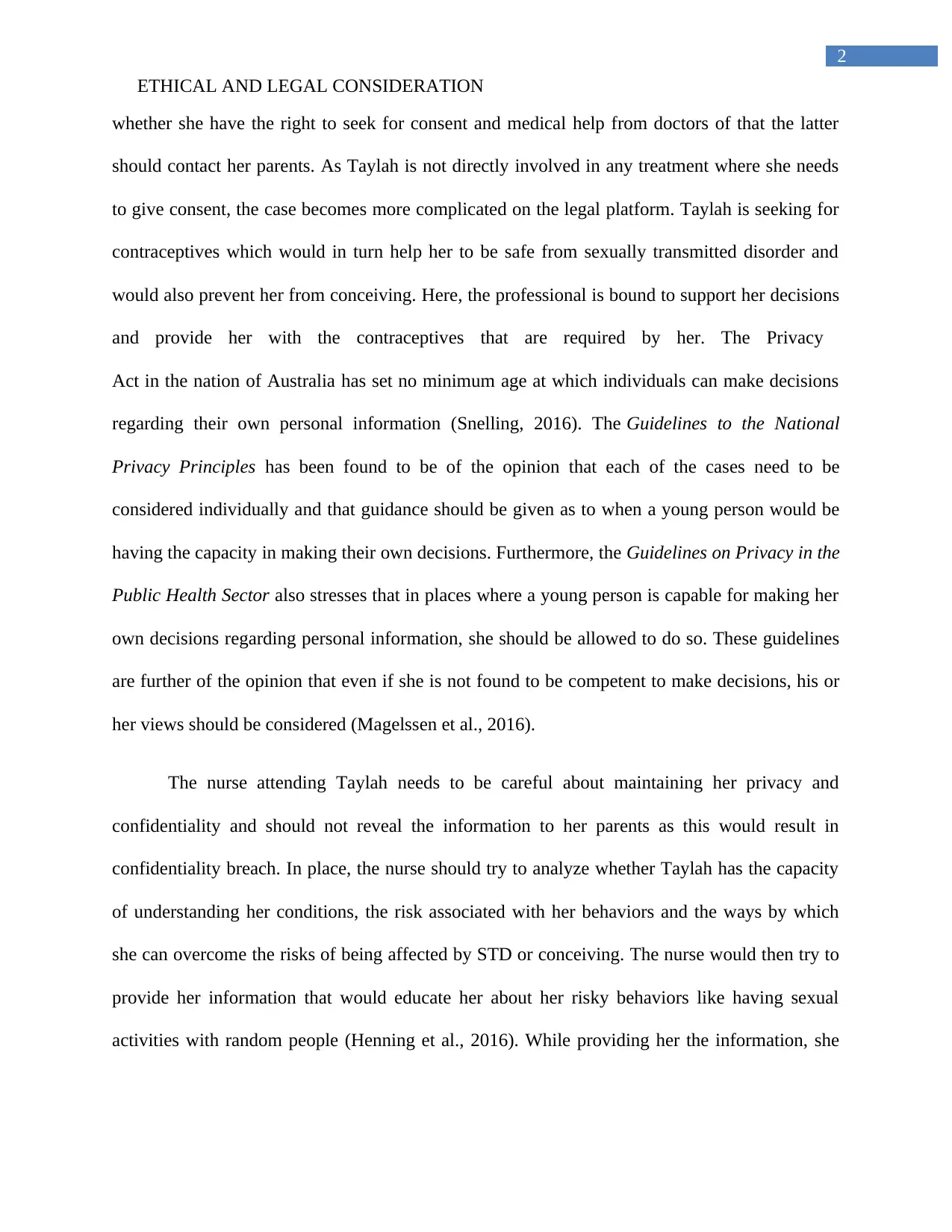
2
ETHICAL AND LEGAL CONSIDERATION
whether she have the right to seek for consent and medical help from doctors of that the latter
should contact her parents. As Taylah is not directly involved in any treatment where she needs
to give consent, the case becomes more complicated on the legal platform. Taylah is seeking for
contraceptives which would in turn help her to be safe from sexually transmitted disorder and
would also prevent her from conceiving. Here, the professional is bound to support her decisions
and provide her with the contraceptives that are required by her. The Privacy
Act in the nation of Australia has set no minimum age at which individuals can make decisions
regarding their own personal information (Snelling, 2016). The Guidelines to the National
Privacy Principles has been found to be of the opinion that each of the cases need to be
considered individually and that guidance should be given as to when a young person would be
having the capacity in making their own decisions. Furthermore, the Guidelines on Privacy in the
Public Health Sector also stresses that in places where a young person is capable for making her
own decisions regarding personal information, she should be allowed to do so. These guidelines
are further of the opinion that even if she is not found to be competent to make decisions, his or
her views should be considered (Magelssen et al., 2016).
The nurse attending Taylah needs to be careful about maintaining her privacy and
confidentiality and should not reveal the information to her parents as this would result in
confidentiality breach. In place, the nurse should try to analyze whether Taylah has the capacity
of understanding her conditions, the risk associated with her behaviors and the ways by which
she can overcome the risks of being affected by STD or conceiving. The nurse would then try to
provide her information that would educate her about her risky behaviors like having sexual
activities with random people (Henning et al., 2016). While providing her the information, she
ETHICAL AND LEGAL CONSIDERATION
whether she have the right to seek for consent and medical help from doctors of that the latter
should contact her parents. As Taylah is not directly involved in any treatment where she needs
to give consent, the case becomes more complicated on the legal platform. Taylah is seeking for
contraceptives which would in turn help her to be safe from sexually transmitted disorder and
would also prevent her from conceiving. Here, the professional is bound to support her decisions
and provide her with the contraceptives that are required by her. The Privacy
Act in the nation of Australia has set no minimum age at which individuals can make decisions
regarding their own personal information (Snelling, 2016). The Guidelines to the National
Privacy Principles has been found to be of the opinion that each of the cases need to be
considered individually and that guidance should be given as to when a young person would be
having the capacity in making their own decisions. Furthermore, the Guidelines on Privacy in the
Public Health Sector also stresses that in places where a young person is capable for making her
own decisions regarding personal information, she should be allowed to do so. These guidelines
are further of the opinion that even if she is not found to be competent to make decisions, his or
her views should be considered (Magelssen et al., 2016).
The nurse attending Taylah needs to be careful about maintaining her privacy and
confidentiality and should not reveal the information to her parents as this would result in
confidentiality breach. In place, the nurse should try to analyze whether Taylah has the capacity
of understanding her conditions, the risk associated with her behaviors and the ways by which
she can overcome the risks of being affected by STD or conceiving. The nurse would then try to
provide her information that would educate her about her risky behaviors like having sexual
activities with random people (Henning et al., 2016). While providing her the information, she
⊘ This is a preview!⊘
Do you want full access?
Subscribe today to unlock all pages.

Trusted by 1+ million students worldwide
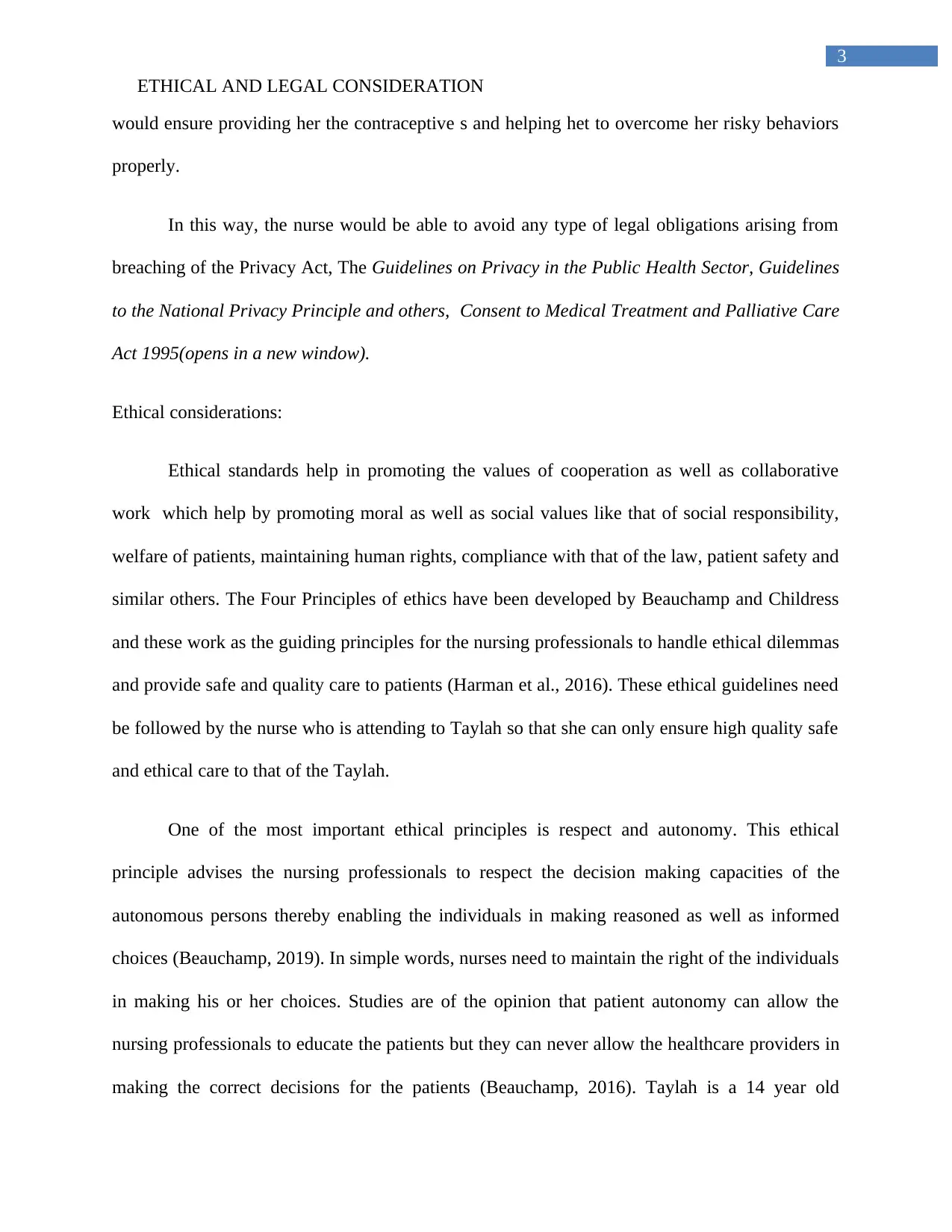
3
ETHICAL AND LEGAL CONSIDERATION
would ensure providing her the contraceptive s and helping het to overcome her risky behaviors
properly.
In this way, the nurse would be able to avoid any type of legal obligations arising from
breaching of the Privacy Act, The Guidelines on Privacy in the Public Health Sector, Guidelines
to the National Privacy Principle and others, Consent to Medical Treatment and Palliative Care
Act 1995(opens in a new window).
Ethical considerations:
Ethical standards help in promoting the values of cooperation as well as collaborative
work which help by promoting moral as well as social values like that of social responsibility,
welfare of patients, maintaining human rights, compliance with that of the law, patient safety and
similar others. The Four Principles of ethics have been developed by Beauchamp and Childress
and these work as the guiding principles for the nursing professionals to handle ethical dilemmas
and provide safe and quality care to patients (Harman et al., 2016). These ethical guidelines need
be followed by the nurse who is attending to Taylah so that she can only ensure high quality safe
and ethical care to that of the Taylah.
One of the most important ethical principles is respect and autonomy. This ethical
principle advises the nursing professionals to respect the decision making capacities of the
autonomous persons thereby enabling the individuals in making reasoned as well as informed
choices (Beauchamp, 2019). In simple words, nurses need to maintain the right of the individuals
in making his or her choices. Studies are of the opinion that patient autonomy can allow the
nursing professionals to educate the patients but they can never allow the healthcare providers in
making the correct decisions for the patients (Beauchamp, 2016). Taylah is a 14 year old
ETHICAL AND LEGAL CONSIDERATION
would ensure providing her the contraceptive s and helping het to overcome her risky behaviors
properly.
In this way, the nurse would be able to avoid any type of legal obligations arising from
breaching of the Privacy Act, The Guidelines on Privacy in the Public Health Sector, Guidelines
to the National Privacy Principle and others, Consent to Medical Treatment and Palliative Care
Act 1995(opens in a new window).
Ethical considerations:
Ethical standards help in promoting the values of cooperation as well as collaborative
work which help by promoting moral as well as social values like that of social responsibility,
welfare of patients, maintaining human rights, compliance with that of the law, patient safety and
similar others. The Four Principles of ethics have been developed by Beauchamp and Childress
and these work as the guiding principles for the nursing professionals to handle ethical dilemmas
and provide safe and quality care to patients (Harman et al., 2016). These ethical guidelines need
be followed by the nurse who is attending to Taylah so that she can only ensure high quality safe
and ethical care to that of the Taylah.
One of the most important ethical principles is respect and autonomy. This ethical
principle advises the nursing professionals to respect the decision making capacities of the
autonomous persons thereby enabling the individuals in making reasoned as well as informed
choices (Beauchamp, 2019). In simple words, nurses need to maintain the right of the individuals
in making his or her choices. Studies are of the opinion that patient autonomy can allow the
nursing professionals to educate the patients but they can never allow the healthcare providers in
making the correct decisions for the patients (Beauchamp, 2016). Taylah is a 14 year old
Paraphrase This Document
Need a fresh take? Get an instant paraphrase of this document with our AI Paraphraser
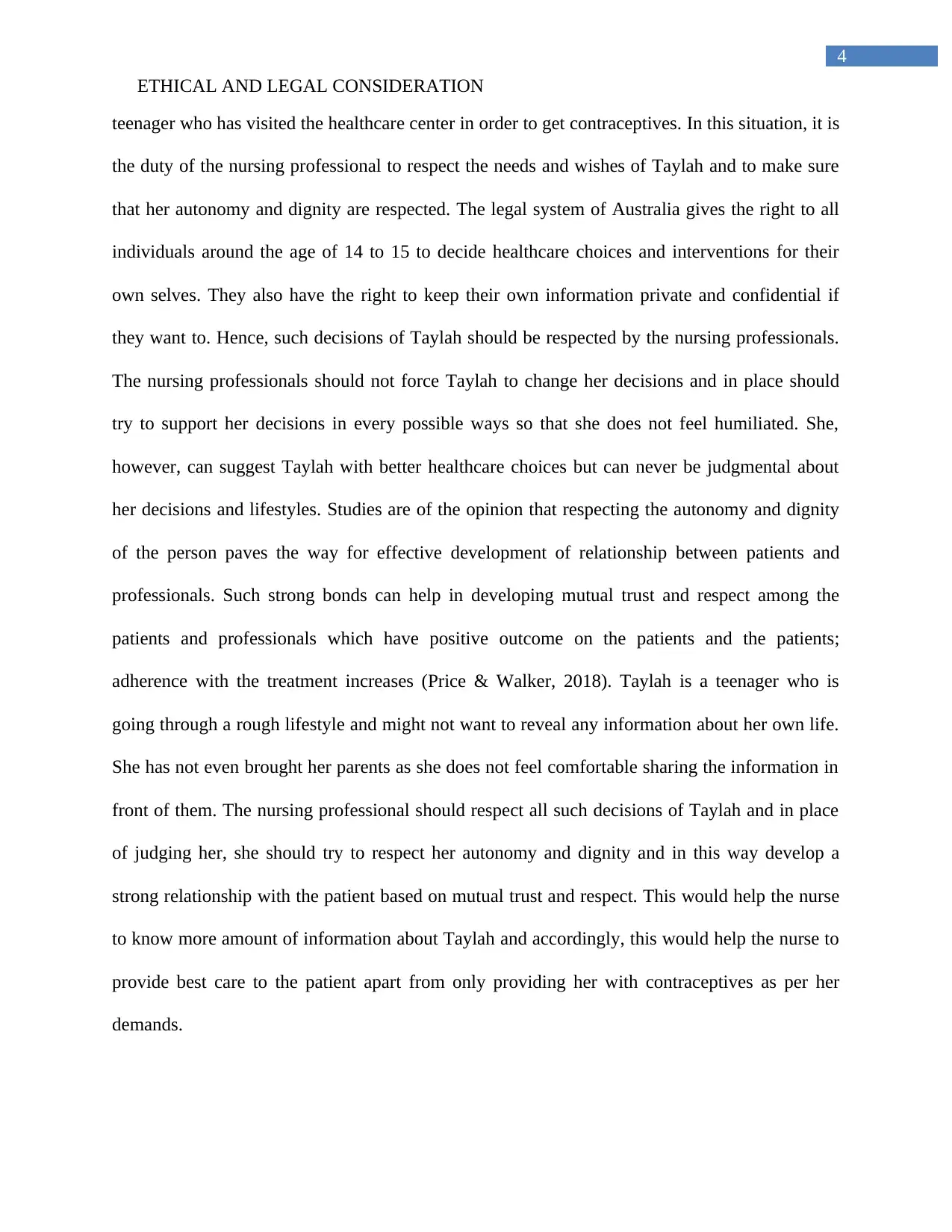
4
ETHICAL AND LEGAL CONSIDERATION
teenager who has visited the healthcare center in order to get contraceptives. In this situation, it is
the duty of the nursing professional to respect the needs and wishes of Taylah and to make sure
that her autonomy and dignity are respected. The legal system of Australia gives the right to all
individuals around the age of 14 to 15 to decide healthcare choices and interventions for their
own selves. They also have the right to keep their own information private and confidential if
they want to. Hence, such decisions of Taylah should be respected by the nursing professionals.
The nursing professionals should not force Taylah to change her decisions and in place should
try to support her decisions in every possible ways so that she does not feel humiliated. She,
however, can suggest Taylah with better healthcare choices but can never be judgmental about
her decisions and lifestyles. Studies are of the opinion that respecting the autonomy and dignity
of the person paves the way for effective development of relationship between patients and
professionals. Such strong bonds can help in developing mutual trust and respect among the
patients and professionals which have positive outcome on the patients and the patients;
adherence with the treatment increases (Price & Walker, 2018). Taylah is a teenager who is
going through a rough lifestyle and might not want to reveal any information about her own life.
She has not even brought her parents as she does not feel comfortable sharing the information in
front of them. The nursing professional should respect all such decisions of Taylah and in place
of judging her, she should try to respect her autonomy and dignity and in this way develop a
strong relationship with the patient based on mutual trust and respect. This would help the nurse
to know more amount of information about Taylah and accordingly, this would help the nurse to
provide best care to the patient apart from only providing her with contraceptives as per her
demands.
ETHICAL AND LEGAL CONSIDERATION
teenager who has visited the healthcare center in order to get contraceptives. In this situation, it is
the duty of the nursing professional to respect the needs and wishes of Taylah and to make sure
that her autonomy and dignity are respected. The legal system of Australia gives the right to all
individuals around the age of 14 to 15 to decide healthcare choices and interventions for their
own selves. They also have the right to keep their own information private and confidential if
they want to. Hence, such decisions of Taylah should be respected by the nursing professionals.
The nursing professionals should not force Taylah to change her decisions and in place should
try to support her decisions in every possible ways so that she does not feel humiliated. She,
however, can suggest Taylah with better healthcare choices but can never be judgmental about
her decisions and lifestyles. Studies are of the opinion that respecting the autonomy and dignity
of the person paves the way for effective development of relationship between patients and
professionals. Such strong bonds can help in developing mutual trust and respect among the
patients and professionals which have positive outcome on the patients and the patients;
adherence with the treatment increases (Price & Walker, 2018). Taylah is a teenager who is
going through a rough lifestyle and might not want to reveal any information about her own life.
She has not even brought her parents as she does not feel comfortable sharing the information in
front of them. The nursing professional should respect all such decisions of Taylah and in place
of judging her, she should try to respect her autonomy and dignity and in this way develop a
strong relationship with the patient based on mutual trust and respect. This would help the nurse
to know more amount of information about Taylah and accordingly, this would help the nurse to
provide best care to the patient apart from only providing her with contraceptives as per her
demands.
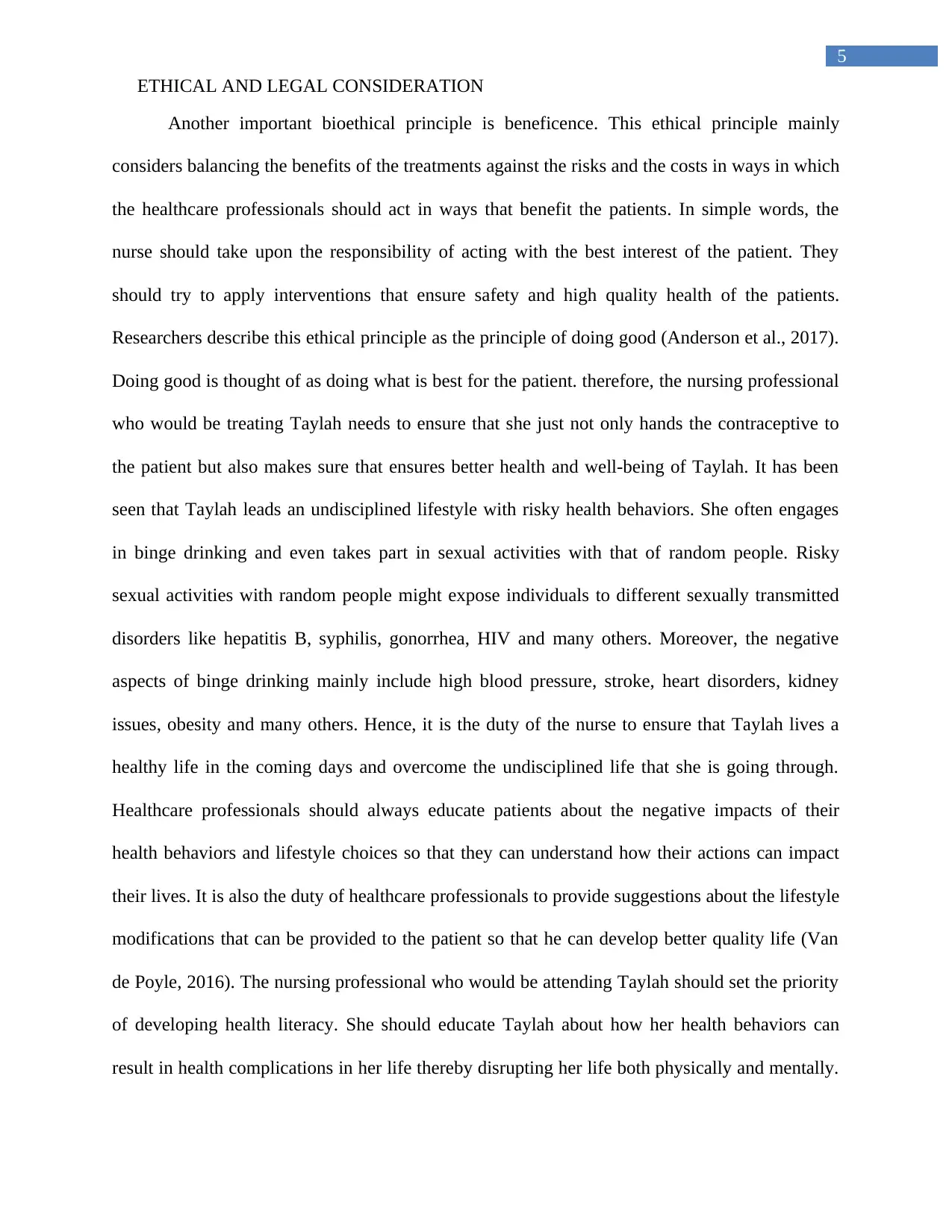
5
ETHICAL AND LEGAL CONSIDERATION
Another important bioethical principle is beneficence. This ethical principle mainly
considers balancing the benefits of the treatments against the risks and the costs in ways in which
the healthcare professionals should act in ways that benefit the patients. In simple words, the
nurse should take upon the responsibility of acting with the best interest of the patient. They
should try to apply interventions that ensure safety and high quality health of the patients.
Researchers describe this ethical principle as the principle of doing good (Anderson et al., 2017).
Doing good is thought of as doing what is best for the patient. therefore, the nursing professional
who would be treating Taylah needs to ensure that she just not only hands the contraceptive to
the patient but also makes sure that ensures better health and well-being of Taylah. It has been
seen that Taylah leads an undisciplined lifestyle with risky health behaviors. She often engages
in binge drinking and even takes part in sexual activities with that of random people. Risky
sexual activities with random people might expose individuals to different sexually transmitted
disorders like hepatitis B, syphilis, gonorrhea, HIV and many others. Moreover, the negative
aspects of binge drinking mainly include high blood pressure, stroke, heart disorders, kidney
issues, obesity and many others. Hence, it is the duty of the nurse to ensure that Taylah lives a
healthy life in the coming days and overcome the undisciplined life that she is going through.
Healthcare professionals should always educate patients about the negative impacts of their
health behaviors and lifestyle choices so that they can understand how their actions can impact
their lives. It is also the duty of healthcare professionals to provide suggestions about the lifestyle
modifications that can be provided to the patient so that he can develop better quality life (Van
de Poyle, 2016). The nursing professional who would be attending Taylah should set the priority
of developing health literacy. She should educate Taylah about how her health behaviors can
result in health complications in her life thereby disrupting her life both physically and mentally.
ETHICAL AND LEGAL CONSIDERATION
Another important bioethical principle is beneficence. This ethical principle mainly
considers balancing the benefits of the treatments against the risks and the costs in ways in which
the healthcare professionals should act in ways that benefit the patients. In simple words, the
nurse should take upon the responsibility of acting with the best interest of the patient. They
should try to apply interventions that ensure safety and high quality health of the patients.
Researchers describe this ethical principle as the principle of doing good (Anderson et al., 2017).
Doing good is thought of as doing what is best for the patient. therefore, the nursing professional
who would be treating Taylah needs to ensure that she just not only hands the contraceptive to
the patient but also makes sure that ensures better health and well-being of Taylah. It has been
seen that Taylah leads an undisciplined lifestyle with risky health behaviors. She often engages
in binge drinking and even takes part in sexual activities with that of random people. Risky
sexual activities with random people might expose individuals to different sexually transmitted
disorders like hepatitis B, syphilis, gonorrhea, HIV and many others. Moreover, the negative
aspects of binge drinking mainly include high blood pressure, stroke, heart disorders, kidney
issues, obesity and many others. Hence, it is the duty of the nurse to ensure that Taylah lives a
healthy life in the coming days and overcome the undisciplined life that she is going through.
Healthcare professionals should always educate patients about the negative impacts of their
health behaviors and lifestyle choices so that they can understand how their actions can impact
their lives. It is also the duty of healthcare professionals to provide suggestions about the lifestyle
modifications that can be provided to the patient so that he can develop better quality life (Van
de Poyle, 2016). The nursing professional who would be attending Taylah should set the priority
of developing health literacy. She should educate Taylah about how her health behaviors can
result in health complications in her life thereby disrupting her life both physically and mentally.
⊘ This is a preview!⊘
Do you want full access?
Subscribe today to unlock all pages.

Trusted by 1+ million students worldwide
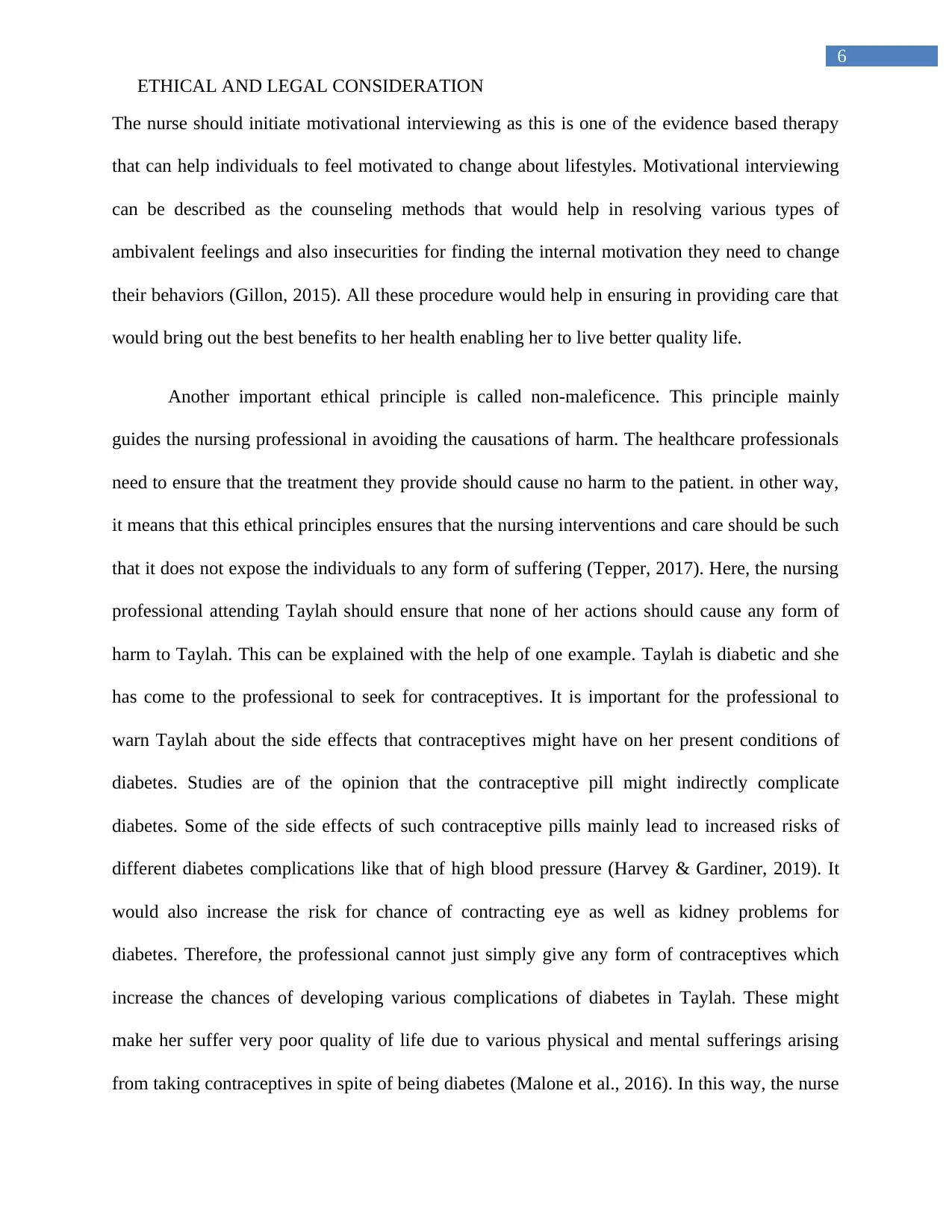
6
ETHICAL AND LEGAL CONSIDERATION
The nurse should initiate motivational interviewing as this is one of the evidence based therapy
that can help individuals to feel motivated to change about lifestyles. Motivational interviewing
can be described as the counseling methods that would help in resolving various types of
ambivalent feelings and also insecurities for finding the internal motivation they need to change
their behaviors (Gillon, 2015). All these procedure would help in ensuring in providing care that
would bring out the best benefits to her health enabling her to live better quality life.
Another important ethical principle is called non-maleficence. This principle mainly
guides the nursing professional in avoiding the causations of harm. The healthcare professionals
need to ensure that the treatment they provide should cause no harm to the patient. in other way,
it means that this ethical principles ensures that the nursing interventions and care should be such
that it does not expose the individuals to any form of suffering (Tepper, 2017). Here, the nursing
professional attending Taylah should ensure that none of her actions should cause any form of
harm to Taylah. This can be explained with the help of one example. Taylah is diabetic and she
has come to the professional to seek for contraceptives. It is important for the professional to
warn Taylah about the side effects that contraceptives might have on her present conditions of
diabetes. Studies are of the opinion that the contraceptive pill might indirectly complicate
diabetes. Some of the side effects of such contraceptive pills mainly lead to increased risks of
different diabetes complications like that of high blood pressure (Harvey & Gardiner, 2019). It
would also increase the risk for chance of contracting eye as well as kidney problems for
diabetes. Therefore, the professional cannot just simply give any form of contraceptives which
increase the chances of developing various complications of diabetes in Taylah. These might
make her suffer very poor quality of life due to various physical and mental sufferings arising
from taking contraceptives in spite of being diabetes (Malone et al., 2016). In this way, the nurse
ETHICAL AND LEGAL CONSIDERATION
The nurse should initiate motivational interviewing as this is one of the evidence based therapy
that can help individuals to feel motivated to change about lifestyles. Motivational interviewing
can be described as the counseling methods that would help in resolving various types of
ambivalent feelings and also insecurities for finding the internal motivation they need to change
their behaviors (Gillon, 2015). All these procedure would help in ensuring in providing care that
would bring out the best benefits to her health enabling her to live better quality life.
Another important ethical principle is called non-maleficence. This principle mainly
guides the nursing professional in avoiding the causations of harm. The healthcare professionals
need to ensure that the treatment they provide should cause no harm to the patient. in other way,
it means that this ethical principles ensures that the nursing interventions and care should be such
that it does not expose the individuals to any form of suffering (Tepper, 2017). Here, the nursing
professional attending Taylah should ensure that none of her actions should cause any form of
harm to Taylah. This can be explained with the help of one example. Taylah is diabetic and she
has come to the professional to seek for contraceptives. It is important for the professional to
warn Taylah about the side effects that contraceptives might have on her present conditions of
diabetes. Studies are of the opinion that the contraceptive pill might indirectly complicate
diabetes. Some of the side effects of such contraceptive pills mainly lead to increased risks of
different diabetes complications like that of high blood pressure (Harvey & Gardiner, 2019). It
would also increase the risk for chance of contracting eye as well as kidney problems for
diabetes. Therefore, the professional cannot just simply give any form of contraceptives which
increase the chances of developing various complications of diabetes in Taylah. These might
make her suffer very poor quality of life due to various physical and mental sufferings arising
from taking contraceptives in spite of being diabetes (Malone et al., 2016). In this way, the nurse
Paraphrase This Document
Need a fresh take? Get an instant paraphrase of this document with our AI Paraphraser
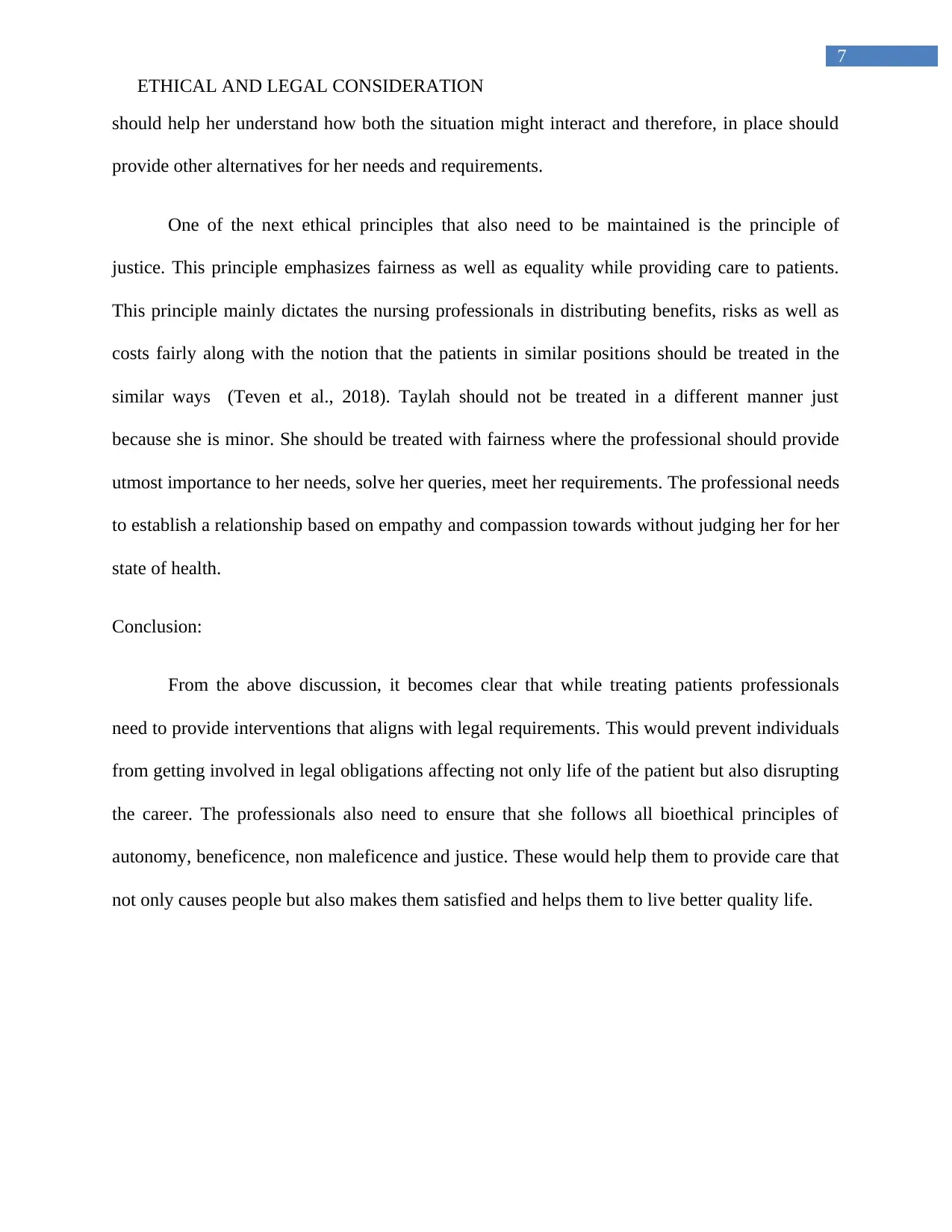
7
ETHICAL AND LEGAL CONSIDERATION
should help her understand how both the situation might interact and therefore, in place should
provide other alternatives for her needs and requirements.
One of the next ethical principles that also need to be maintained is the principle of
justice. This principle emphasizes fairness as well as equality while providing care to patients.
This principle mainly dictates the nursing professionals in distributing benefits, risks as well as
costs fairly along with the notion that the patients in similar positions should be treated in the
similar ways (Teven et al., 2018). Taylah should not be treated in a different manner just
because she is minor. She should be treated with fairness where the professional should provide
utmost importance to her needs, solve her queries, meet her requirements. The professional needs
to establish a relationship based on empathy and compassion towards without judging her for her
state of health.
Conclusion:
From the above discussion, it becomes clear that while treating patients professionals
need to provide interventions that aligns with legal requirements. This would prevent individuals
from getting involved in legal obligations affecting not only life of the patient but also disrupting
the career. The professionals also need to ensure that she follows all bioethical principles of
autonomy, beneficence, non maleficence and justice. These would help them to provide care that
not only causes people but also makes them satisfied and helps them to live better quality life.
ETHICAL AND LEGAL CONSIDERATION
should help her understand how both the situation might interact and therefore, in place should
provide other alternatives for her needs and requirements.
One of the next ethical principles that also need to be maintained is the principle of
justice. This principle emphasizes fairness as well as equality while providing care to patients.
This principle mainly dictates the nursing professionals in distributing benefits, risks as well as
costs fairly along with the notion that the patients in similar positions should be treated in the
similar ways (Teven et al., 2018). Taylah should not be treated in a different manner just
because she is minor. She should be treated with fairness where the professional should provide
utmost importance to her needs, solve her queries, meet her requirements. The professional needs
to establish a relationship based on empathy and compassion towards without judging her for her
state of health.
Conclusion:
From the above discussion, it becomes clear that while treating patients professionals
need to provide interventions that aligns with legal requirements. This would prevent individuals
from getting involved in legal obligations affecting not only life of the patient but also disrupting
the career. The professionals also need to ensure that she follows all bioethical principles of
autonomy, beneficence, non maleficence and justice. These would help them to provide care that
not only causes people but also makes them satisfied and helps them to live better quality life.
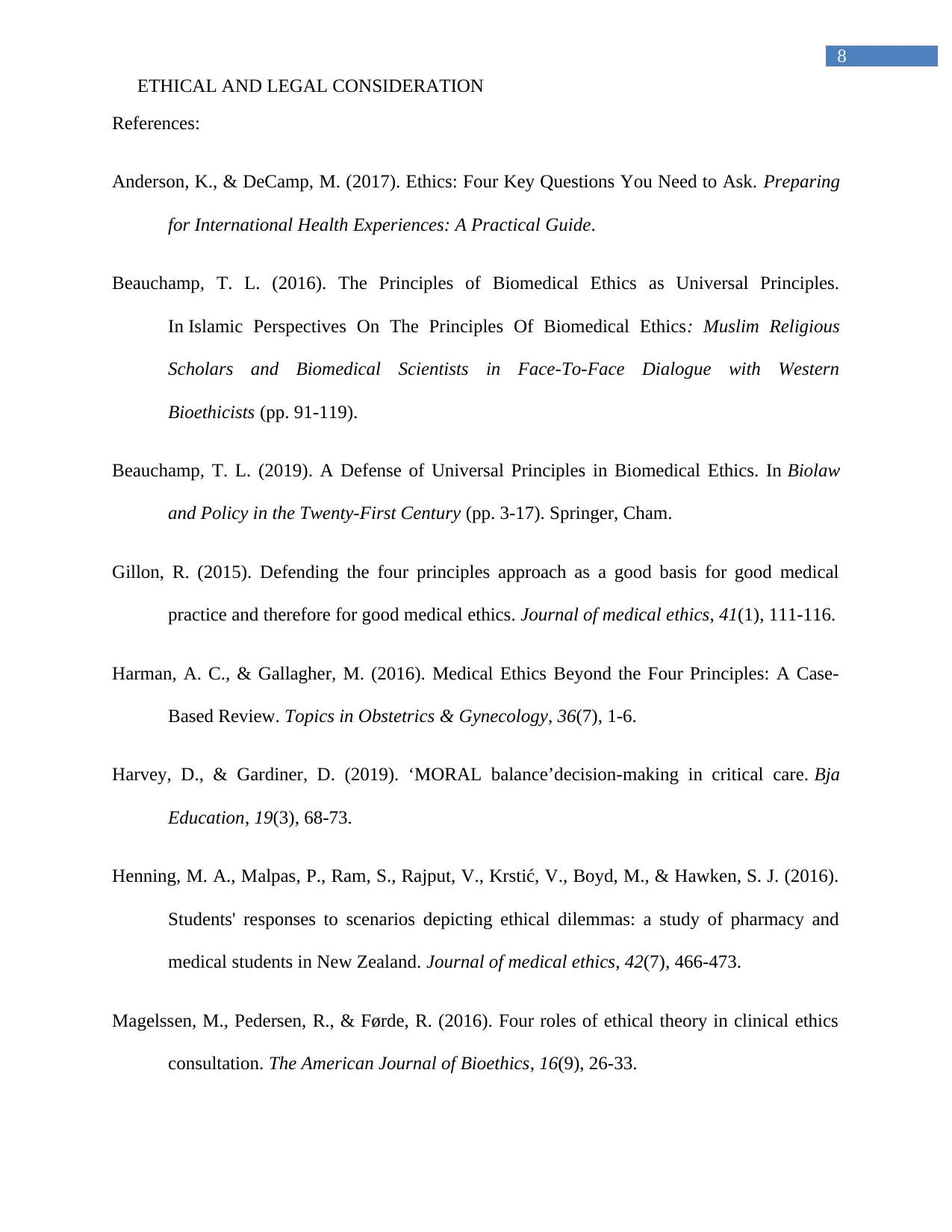
8
ETHICAL AND LEGAL CONSIDERATION
References:
Anderson, K., & DeCamp, M. (2017). Ethics: Four Key Questions You Need to Ask. Preparing
for International Health Experiences: A Practical Guide.
Beauchamp, T. L. (2016). The Principles of Biomedical Ethics as Universal Principles.
In Islamic Perspectives On The Principles Of Biomedical Ethics: Muslim Religious
Scholars and Biomedical Scientists in Face-To-Face Dialogue with Western
Bioethicists (pp. 91-119).
Beauchamp, T. L. (2019). A Defense of Universal Principles in Biomedical Ethics. In Biolaw
and Policy in the Twenty-First Century (pp. 3-17). Springer, Cham.
Gillon, R. (2015). Defending the four principles approach as a good basis for good medical
practice and therefore for good medical ethics. Journal of medical ethics, 41(1), 111-116.
Harman, A. C., & Gallagher, M. (2016). Medical Ethics Beyond the Four Principles: A Case-
Based Review. Topics in Obstetrics & Gynecology, 36(7), 1-6.
Harvey, D., & Gardiner, D. (2019). ‘MORAL balance’decision-making in critical care. Bja
Education, 19(3), 68-73.
Henning, M. A., Malpas, P., Ram, S., Rajput, V., Krstić, V., Boyd, M., & Hawken, S. J. (2016).
Students' responses to scenarios depicting ethical dilemmas: a study of pharmacy and
medical students in New Zealand. Journal of medical ethics, 42(7), 466-473.
Magelssen, M., Pedersen, R., & Førde, R. (2016). Four roles of ethical theory in clinical ethics
consultation. The American Journal of Bioethics, 16(9), 26-33.
ETHICAL AND LEGAL CONSIDERATION
References:
Anderson, K., & DeCamp, M. (2017). Ethics: Four Key Questions You Need to Ask. Preparing
for International Health Experiences: A Practical Guide.
Beauchamp, T. L. (2016). The Principles of Biomedical Ethics as Universal Principles.
In Islamic Perspectives On The Principles Of Biomedical Ethics: Muslim Religious
Scholars and Biomedical Scientists in Face-To-Face Dialogue with Western
Bioethicists (pp. 91-119).
Beauchamp, T. L. (2019). A Defense of Universal Principles in Biomedical Ethics. In Biolaw
and Policy in the Twenty-First Century (pp. 3-17). Springer, Cham.
Gillon, R. (2015). Defending the four principles approach as a good basis for good medical
practice and therefore for good medical ethics. Journal of medical ethics, 41(1), 111-116.
Harman, A. C., & Gallagher, M. (2016). Medical Ethics Beyond the Four Principles: A Case-
Based Review. Topics in Obstetrics & Gynecology, 36(7), 1-6.
Harvey, D., & Gardiner, D. (2019). ‘MORAL balance’decision-making in critical care. Bja
Education, 19(3), 68-73.
Henning, M. A., Malpas, P., Ram, S., Rajput, V., Krstić, V., Boyd, M., & Hawken, S. J. (2016).
Students' responses to scenarios depicting ethical dilemmas: a study of pharmacy and
medical students in New Zealand. Journal of medical ethics, 42(7), 466-473.
Magelssen, M., Pedersen, R., & Førde, R. (2016). Four roles of ethical theory in clinical ethics
consultation. The American Journal of Bioethics, 16(9), 26-33.
⊘ This is a preview!⊘
Do you want full access?
Subscribe today to unlock all pages.

Trusted by 1+ million students worldwide
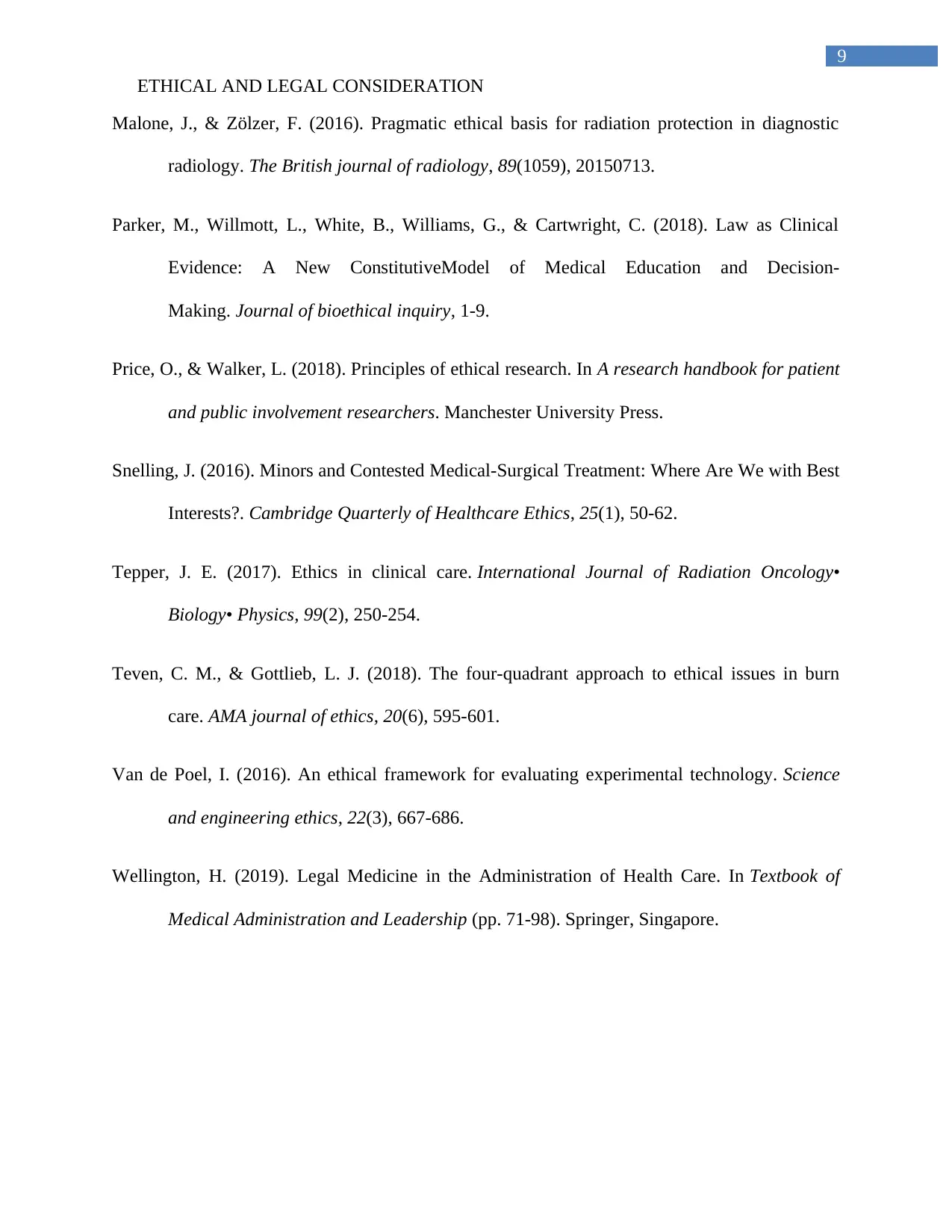
9
ETHICAL AND LEGAL CONSIDERATION
Malone, J., & Zölzer, F. (2016). Pragmatic ethical basis for radiation protection in diagnostic
radiology. The British journal of radiology, 89(1059), 20150713.
Parker, M., Willmott, L., White, B., Williams, G., & Cartwright, C. (2018). Law as Clinical
Evidence: A New ConstitutiveModel of Medical Education and Decision-
Making. Journal of bioethical inquiry, 1-9.
Price, O., & Walker, L. (2018). Principles of ethical research. In A research handbook for patient
and public involvement researchers. Manchester University Press.
Snelling, J. (2016). Minors and Contested Medical-Surgical Treatment: Where Are We with Best
Interests?. Cambridge Quarterly of Healthcare Ethics, 25(1), 50-62.
Tepper, J. E. (2017). Ethics in clinical care. International Journal of Radiation Oncology•
Biology• Physics, 99(2), 250-254.
Teven, C. M., & Gottlieb, L. J. (2018). The four-quadrant approach to ethical issues in burn
care. AMA journal of ethics, 20(6), 595-601.
Van de Poel, I. (2016). An ethical framework for evaluating experimental technology. Science
and engineering ethics, 22(3), 667-686.
Wellington, H. (2019). Legal Medicine in the Administration of Health Care. In Textbook of
Medical Administration and Leadership (pp. 71-98). Springer, Singapore.
ETHICAL AND LEGAL CONSIDERATION
Malone, J., & Zölzer, F. (2016). Pragmatic ethical basis for radiation protection in diagnostic
radiology. The British journal of radiology, 89(1059), 20150713.
Parker, M., Willmott, L., White, B., Williams, G., & Cartwright, C. (2018). Law as Clinical
Evidence: A New ConstitutiveModel of Medical Education and Decision-
Making. Journal of bioethical inquiry, 1-9.
Price, O., & Walker, L. (2018). Principles of ethical research. In A research handbook for patient
and public involvement researchers. Manchester University Press.
Snelling, J. (2016). Minors and Contested Medical-Surgical Treatment: Where Are We with Best
Interests?. Cambridge Quarterly of Healthcare Ethics, 25(1), 50-62.
Tepper, J. E. (2017). Ethics in clinical care. International Journal of Radiation Oncology•
Biology• Physics, 99(2), 250-254.
Teven, C. M., & Gottlieb, L. J. (2018). The four-quadrant approach to ethical issues in burn
care. AMA journal of ethics, 20(6), 595-601.
Van de Poel, I. (2016). An ethical framework for evaluating experimental technology. Science
and engineering ethics, 22(3), 667-686.
Wellington, H. (2019). Legal Medicine in the Administration of Health Care. In Textbook of
Medical Administration and Leadership (pp. 71-98). Springer, Singapore.
1 out of 10
Related Documents
Your All-in-One AI-Powered Toolkit for Academic Success.
+13062052269
info@desklib.com
Available 24*7 on WhatsApp / Email
![[object Object]](/_next/static/media/star-bottom.7253800d.svg)
Unlock your academic potential
Copyright © 2020–2026 A2Z Services. All Rights Reserved. Developed and managed by ZUCOL.





